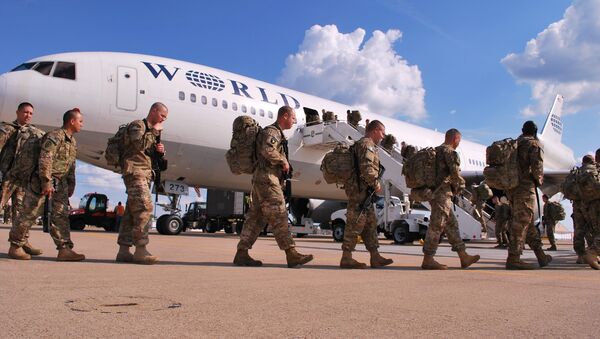At the time, the extra troops brought the combined total to around 100,000, making for a significant military deployment in the Central Asian nation. For a while it seemed like the decision was a success and that the Taliban were being defeated, but this was just an illusion. Instead, the group was merely biding its time and waiting for the previously announced withdrawal to make their move. Since then, they’ve been back on the offensive and creating just as much trouble as before, albeit with less opposition to stop them. Therefore, Afghanistan recently entered into an agreement to let 12,000 US and NATO troops remain in country after the ‘withdrawal’ to ensure that things don’t get too far out of hand. In hindsight, all of this makes the surge one big failure.
Iraqi Implications
It’s important to remember what happened with the Afghan surge since Iraq is currently experiencing its own version of it. Right now, Iraqi forces are gearing up (with US training and supervision) to begin a counter-offensive against ISIL sometime next year. And it’s not just the official military that’s getting ready, but also the US-sponsored Kurdish Peshmerga and certain pro-US Sunni tribes, creating a hodgepodge of militant rival interests that are only united for a short-term cause.
What’s more, Jordan has volunteered the use of its ground forces in any anti-ISIL offensive, opening the door for other neighboring states to do the same, each with their own possibly competing interests. It can also not be discounted that more US troops will enter the country, ostensibly under a ‘non-combat role’, in order to assist with this, and it’s a given that US and coalition airstrikes will accompany any ground offensive. As more troops and hardware pile into Iraq and the country’s domestic armed forces (legitimate and unofficial) surge in number, the country might just be setting itself up for one epic disaster.
The Edge Of The Abyss
When competing military forces (both international and domestic) come together, it’s a given that they’ll fall out with one another in dividing the spoils afterwards. This is the exact scenario that Iraq is facing right now, and the centripetal forces competing within it might just be enough to tear the entire structure apart.
First off, just like with the surge against the Taliban, there’s no assurance that tens of thousands of troops in Iraq can defeat ISIL. They may crush its conventional fighting ability, but in terms of asymmetric warfare, ISIL could still bounce back and resurrect itself.
This would lead to a prolonged occupation of Western Iraq in order to stem the group’s expected insurgency, and it’ll be a sensitive issue over which forces will bear this burden (especially considering the complex political, ethnic, and sectarian matrices at play).
And even assuming that ISIL can be defeated (however temporarily), Iraq isn’t out of the woods yet, since the battle over its internal divisions would have only just begun. For example, if the ISIL threat is relatively pacified, would the Iraqi Army and its supporters head north to evict the Kurds from Kirkuk, which they’ve been occupying since this summer? And would the Sunni tribesmen turn on the central government and call for an autonomous federal-type status within a reconfigured Iraq?
And what about the foreign troops based in the country, US or otherwise? If they don’t leave right away (which they likely won’t), whose side will they take and what interests will they pursue?
This is not to say that some military component isn’t needed, but the way Iraq’s internal affairs are playing out, it may actually be more for the worse than for the better.
Past The Point Of No Return
To make matters even worse, when the coalition launches their massive offensive against ISIL, it’s doubtful that they’ll stop at the Syrian border and allow ISIL the time to regroup and recover there. More than likely, they’ll keep the momentum going and surge across the threshold and outright invade Syria under the pretense of fighting the terrorist group. Right away, this could open the coalition forces up to a counterattack by the Syrian Arab Army (SAA), which has already said it would defend itself against any foreign invasion regardless of the ‘positive’ intentions behind it.
Even in the event that the SAA strategically waits it out and doesn’t immediately attack the invading forces, ISIL will likely be driven even closer to the Army’s front lines, with the coalition hot on their tail. This might lead to a direct head-on confrontation between the SAA and the coalition due to an unforeseen provocation, which would then give the ‘anti-terrorist’ alliance the green light to morph into a regime change alliance (which they’ve always intended to be).
No matter how the scenario plays out, once the coalition is officially inside Syrian territory, they’re not going to leave until they achieve their political goals, even if this means ‘chasing’ ISIL all the way to Damascus and, annihilating everything along the way.
And that’s what makes the ongoing ‘anti-ISIL surge’ so dangerous – it’s not just aimed at destroying ISIL, but at attaining unspoken political goals. Even assuming that the coalition doesn’t cross into Syrian territory to pursue regime change, it’s impossible to guarantee that it won’t use its military advantage to alter the situation inside Iraq as the country strenuously attempts to reconfigure itself.
More than likely, foreign troops will justify their extended occupation under the argument that ISIL may turn out to be just as resilient as the Taliban, and will bounce right back in a year or two without an international military presence on the ground. After each conflict is officially ‘resolved’ (ISIL defeated in Iraq and/or regime change in Syria), that’s when the most vicious rivalries between the armed parties will flare up and turn the Mideast back into a madhouse.





